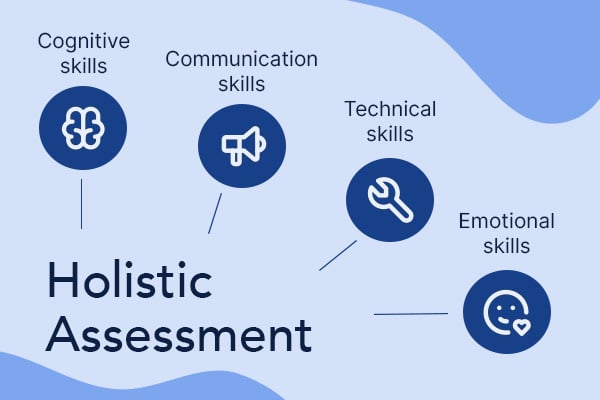Holistic assessment is an intricate and multifaceted evaluative process that seeks to understand the whole individual rather than merely the sum of their parts. This approach is especially significant in educational and psychological contexts, where the complexity of human experiences necessitates a comprehensive lens. Embarking on a discussion of holistic assessment requires an exploration of its foundations, methodologies, critiques, and implications for practice. A nuanced understanding of this concept reveals the dynamic interplay between assessment, teaching, and learning in diverse environments.
Central to the framework of holistic assessment is the recognition that human beings are inherently complex, influenced by a myriad of factors that contribute to their development and performance. This perspective not only embraces the cognitive dimensions of learning but also considers emotional, social, and physical aspects. Rather than reducing individuals to a set of standardized scores, holistic assessment aims to paint a richer, more textured portrait of learners by considering their personal experiences, context, and unique learning styles.
While traditional assessment often relies on quantitative metrics—standardized tests and grades—holistic assessment incorporates qualitative methods such as self-assessments, peer reviews, and portfolios. This variety of evaluative approaches encourages a deeper engagement with material and promotes critical thinking, autonomy, and reflective practices. Equally, it underscores the importance of creating a supportive environment that fosters student voice and agency in the learning process.
In exploring the methodology of holistic assessment, one can identify a spectrum of strategies that educators and practitioners employ. These strategies can be categorized into formative and summative assessments. Formative assessments are ongoing processes that occur throughout the educational experience, allowing educators to adapt instruction to meet student needs. Techniques such as anecdotal records, observational assessments, and journals enable educators to gather insights into learner progress, not merely with an aim towards grades but towards fostering growth and understanding. Conversely, summative assessments typically conclude a learning segment and often take the form of presentations, projects, or comprehensive exams that challenge students to demonstrate their learning in a contextualized manner.
The integration of various assessment methods within a holistic framework acknowledges the diverging pathways that learners travel. Students with varied backgrounds and experiences bring unique strengths to the educational setting, which can be highlighted through differentiated assessment tasks that respect individual learning preferences. The capacity of holistic assessment to recognize and valuate diverse intelligences and competencies reflects a progressive pedagogical stance against rigid standardization. By employing a pluralistic view of intelligence, educators can provide a platform for varied expressions of knowledge, thereby cultivating an inclusive learning atmosphere.
Whilst the advantages of holistic assessment are manifold, it is critical to acknowledge the potential limitations and challenges inherent in its implementation. One prominent concern pertains to the consistency and reliability of qualitative assessments. Unlike standardized tests, which offer clear metrics for comparison, holistic evaluations can be subjective, potentially leading to discrepancies in grading or evaluation standards. Consequently, there is a need for clear rubrics and guidelines that ensure assessments remain anchored in fairness and objectivity, even amidst the fluidity of individual experiences. In fostering a coherent assessment framework, educators must strike a balance between subjective insights and objective criteria.
Moreover, the effective implementation of holistic assessment necessitates a paradigm shift within educational institutions. Professional development and training are essential, equipping educators with the necessary skills, confidence, and understanding to conduct holistic assessments effectively. Institutions must cultivate a culture that values holistic approaches not just in theory but also in practice, promoting collaboration among teachers to share successful strategies and grapple with collective challenges.
Furthermore, understanding the intersectionality of learners’ identities—gender, race, socio-economic status, ability, and other facets—adds another layer of complexity to holistic assessment. Gender analyses, for example, can reveal disparities in learner participation and achievement, informing educators about potential biases that must be addressed. Holistic assessment therefore serves not only as a tool for individual understanding but also as a mechanism for social justice, revealing how systemic inequities can manifest within educational settings.
In cultivating a genuinely holistic assessment culture, educators can promote equity and inclusiveness. When assessment frameworks are adjusted to recognize multiple perspectives and histories, they invite a broader array of experiences into the learning fold. This inclusivity reaffirms the inherent worth and unique contributions of each learner—an essential acknowledgment in any educational environment.
Moreover, with the rise of technology and digital pedagogies, the scope for holistic assessment takes on further dimensions. Digital portfolios and online self-assessments can facilitate reflection and provide avenues for students to take ownership of their learning journeys. Engaging with technology allows for diverse representations of learning to emerge, thereby expanding the definition of success beyond conventional parameters. Nevertheless, it is crucial to remain vigilant regarding the digital divide, ensuring that all students have equitable access to these technological tools.
The overarching goal of holistic assessment is to promote learner agency. By positioning students at the center of the assessment process, educators foster a sense of accountability and ownership over learning. When students are empowered to take an active role in assessing their knowledge and skills, the learning experiences deepen, contributing to intrinsic motivation and self-efficacy. This empowerment arises from not merely the act of assessment but in the dialogic interactions that occur between educator and learner, ensuring that the narrative of the learner is acknowledged and valued.
In navigating the trajectory of holistic assessment, it is vital to maintain a commitment to continuous reflection and improvement. Assessment should not be an end in itself but an integral part of the learning ecosystem that spans across pedagogical practices, learner experiences, and institutional aims. As educators embrace the philosophy of holistic assessment, they ultimately contribute to the nurturing of well-rounded individuals—critical thinkers, empathetic collaborators, and lifelong learners poised to navigate, contribute to, and enrich the complexities of an ever-evolving world.
